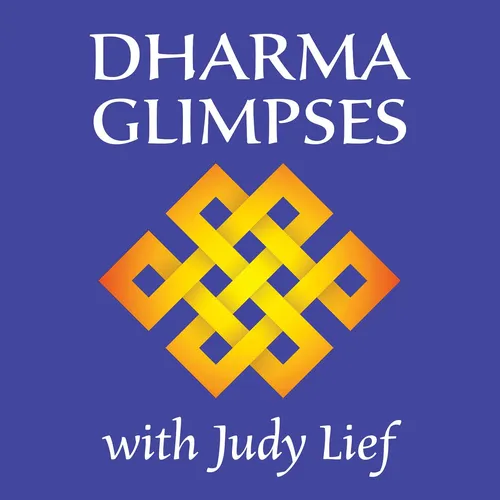
Dharma Glimpses with Judy Lief
DHARMA GLIMPSES is an introduction to The Profound Treasury teachings of Chögyam Trungpa Rinpoche, taught by Judy Lief. In these short, accessible talks, Judy invites listeners to explore the subtleties and delights of the Buddhist path of meditation and insight. She introduces listeners to some of the key ways that mark Chögyam Trungpa Rinpoche's unique and brilliant exposition of the dharma in the context of contemporary Western society.
- Update frequency
- every 7 days
- Average duration
- 7 minutes
- Episodes
- 241
- Years Active
- 2020 - 2025

Episode 21: It's Up to You
Theism and materialism are closely related • "theism" does not simply refer to specific religious traditions, but more broadly to the human tendency to always want to be saved, to have someone else…

Episode 20: Buried Treasure
In some ways the Buddhist teachings are all about being on a journey • in order to get anywhere, we have to have a sense of the lay of the land, and a sense of where we're trying to go • the firs…

Episode 19: Buddha's Four Insights
At this level, the fundamental teachings of the Buddha can be expressed in just four small points • the first point: acknowledging the difficulties of life — the reality of pain, suffering, and con…

Episode 18: Taming and Opening the Mind
Two additional streams run through the Profound Treasury teachings: mindfulness practice and awareness practice • mindfulness, also called shamatha, means “peace” and refers to the stillness and sta…

Episode 17: Study, Practice, and Action
When people hear the word “buddha” or “buddhism,” what usually comes to mind is the idea of meditation or mindfulness training • but the practice of meditation is so much richer when placed in the…

Episode 16: The Spell of Materialism
When Trungpa Rinpoche first came to the West he was struck by our obsession with materialism and materialistic success • he referred to materialism as a “spell” or a thick black fog that traps us i…

Episode 15: Dharma is Everything
“Dharma” is everything; it is a very intimate and personal way of looking at everything we do • what are our preconceptions, our beliefs, our hopes and dreams? • have we really ever felt comforta…

Episode 14: Touch and Go
“Touch and go” refers to how we relate to thoughts, distractions and sensations that arise during sitting meditation • it represents a middle way between the extremes of avoiding our experience and…

Episode 13: Not Too Tight, Not Too Loose
Finding the right balance in our practice keeps us engaged with without being overly effortful • too loose = being spaced-out, indulgent, forgetful; too tight = being really hard on ourselves • s…

Episode 12: On-the-Spot Practice
The skills we learn in formal meditation practice can be applied on-the-spot as we face challenges in our daily life • training to come back into your body; giving yourself just a moment to come ba…

Episode 11: Training to be More Present
In meditation we are practicing being more wholeheartedly present • learning to recognize our escape valves, the ways we hide out from our immediate experience • wholeheartedly feeling what we fe…

Episode 10: Meditation as a Way of Making Friends with Yourself
Meditation as a way of making friends with yourself • inviting in all aspects of yourself to a banquet of experience • workability: staying with our experience, whatever it is, at is arises • b…

Episode 9: The Tree, The Rock, and The Blade of Grass
The story of the tree, the rock, and the blade of grass • flexibility, steadiness, resilience: these are the qualities that are cultivated in meditation practice • rooted and flexible; you may be…

Episode 8: Dripping Water on a Stone
The first kind of effort is just showing up • just getting to the cushion is the hardest part • simply giving in and surrendering to the discipline • soft yet strong effort is what is called fo…

Episode 7: Noting Thoughts and Returning to the Breath
Two different aspects of thinking: the content of thoughts and the thinking process • where do thoughts come from? where do they go? • stillness of mind and activity of mind • like watching chi…

Episode 6: Letting Go with the Outbreath
We place our mind on the outbreath, and then we let go • this form of mediation is based on dissolving outward, looking beyond ourselves • a rhythm of relaxing and regrouping, relaxing and regrou…

Episode 5: Being Intimate with the Breath
Our breath is our most intimate connection with life itself • we are continually in a process of exchanging inside and outside • the inbreath is taking in, and the outbreath is letting go • the …

Episode 4: Sitting Like a Mountain
Sitting like a mountain: solid, immovable, content • meditation posture provides a container within which you can relax • sitting with uprightness and dignity (“head and shoulders”) • senses re…

Episode 3: The Role of Posture
Learning to come into our body in a simple and direct way • psychological body vs. sensory body • start with just being still • “perching” vs completely settling in like a rotting log • noticin…

Episode 2: Meditation Practice
The importance of setting clear boundaries • start with a clear beginning • sit down, slow down, and come into your body • take a relaxed, dignified, upright posture • breathe naturally and p…